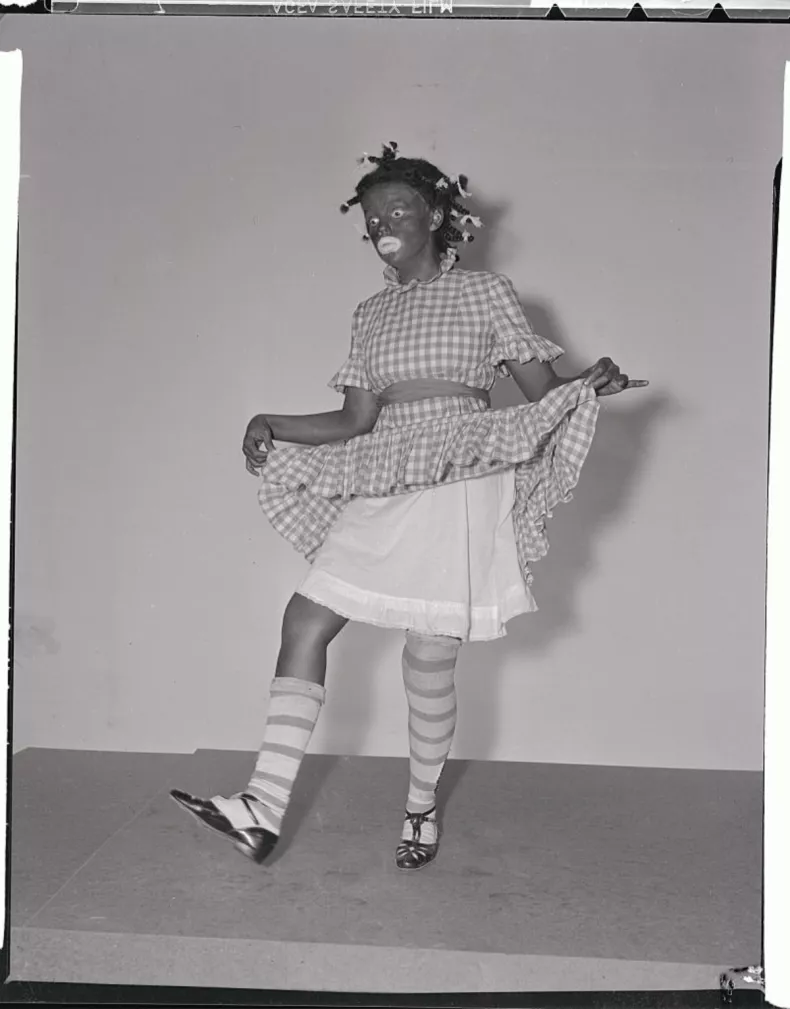Shocking Rediscovery: Judy Garland's Startling Past Unveiled!
Unveiling Judy Garland's Historical Image: A Defending Look at a Complex Legacy
Discovering the Past: Judy Garland's Unearthed Image Sparks Conversation
 |
| The young Judy Garland wears blackface in the musical comedy "Everybody Sing" (1938). In the movie, the actor and singer played a teen that joins a music group to escape her dysfunctional family. |
In a recent resurgence on social media, a photograph featuring Judy Garland in blackface has captured attention, prompting fervent support for the late child prodigy.
The snapshot originates from the 1938 film "Everybody Sing," where a young Garland assumed the role of Judy Bellaire in a musical comedy. Portraying a character escaping a tumultuous family, Garland found herself performing as a blackface singer with altered complexion, prominent white lips, and styled dreadlocks. Although the movie dates back 85 years, its newfound prominence occurred on August 16 when @browardbully shared the image alongside Garland's appearance in the 1939 cinematic classic "The Wizard of Oz," accompanied by the caption: "two movies. a year apart. same b****. shoutout to Gen Z for teaching me this."
two movies. a year apart. same bitch.
— Twi. 🇭🇹 (from RUNNING TRIZZ) (@browardbully) August 16, 2023
shoutout to Gen Z for teaching me this. pic.twitter.com/kAb0EZN2QN
The post garnered over 36 million views, causing a stir in online communities. However, the uproar was not solely centered around the blackface portrayal. Admirers swiftly rallied in defense of the actress, redirecting the conversation toward Garland's well-documented history of abuse, both at the hands of her parents and within the entertainment industry.
Empathy for a Young Star: A Call to Understand Garland's Context
Queen Minaj, a user on the platform, empathetically noted, "She was a child forced to do this. It wasn't 2023."
Alex Silva furthered the sentiment, highlighting the lack of agency Garland possessed as a minor and woman in the 1930s, given the control exerted by abusive management and her parents. KJ-isms chimed in, urging a walk in Garland's shoes to inspire empathy and understanding.
The message was clear: scrutinizing a former child star for actions committed under such circumstances seemed incongruous, especially given the prevailing norms of the era.
A Plea for Context and Compassion
Within this dialogue, Hozonkai urged restraint in directing cancel culture towards a deceased former child actress, advocating for a more nuanced consideration of historical context. Yuh echoed the sentiment, emphasizing the importance of grasping not only the Hollywood landscape of the time but also the profound challenges Garland endured.
The Complex Journey of Judy Garland: From Early Stardom to Advocacy
Born Frances Ethel Gumm in 1922, Garland's talent graced the stage from an early age, propelling her to musical stardom. In 1935, she signed with Metro-Goldwyn-Mayer (MGM), an engagement that led to her iconic role as Dorothy in the timeless classic "The Wizard of Oz" (1939).
However, Garland's path was marred by a troubled upbringing. Relocating from Grand Rapids, Minnesota, to Lancaster, California, at the age of 4, her mother's determination to shape her daughters into stars marked the start of a tumultuous journey. Beginning at the age of 10, Garland was subjected to amphetamines in the morning and sleeping pills at night, closely monitored dietary habits, and grueling schedules.
 |
| Judy Garland holds a basket in "The Wizard of Oz" (1939). Although it was her most-famous movie, there have been multiple claims that the teen was abused while filming the musical. |
Her seven-year tenure with MGM entailed intense schedules, including schooling, singing practice, and filming. By 15, Garland's addiction to pills was apparent, and during "The Wizard of Oz" production, she subsisted on a meager diet to maintain a slender physique.
The Struggles Beyond the Spotlight
Tragically, Garland's professional journey was marked by personal turmoil. Allegations of sexual harassment accompanied her path, including incidents with studio executives and fellow actors. This challenging backdrop was juxtaposed with her commitment to the civil rights movement in the 1960s, demonstrating her engagement with social issues.
Defending Garland's Legacy: A Larger Conversation
Amid discussions sparked by @browardbully's tweet, users acknowledged Garland's lack of agency during her early career while highlighting her later dedication to civil rights activism. The emphasis was on recognizing the complexity of her life and legacy, acknowledging the multifaceted roles she played beyond her controversial early roles.
Ultimately, the conversation urged a holistic view of Judy Garland—one that transcends the boundaries of time and highlights the intersection of her struggles, triumphs, and contributions to society.


Post a Comment